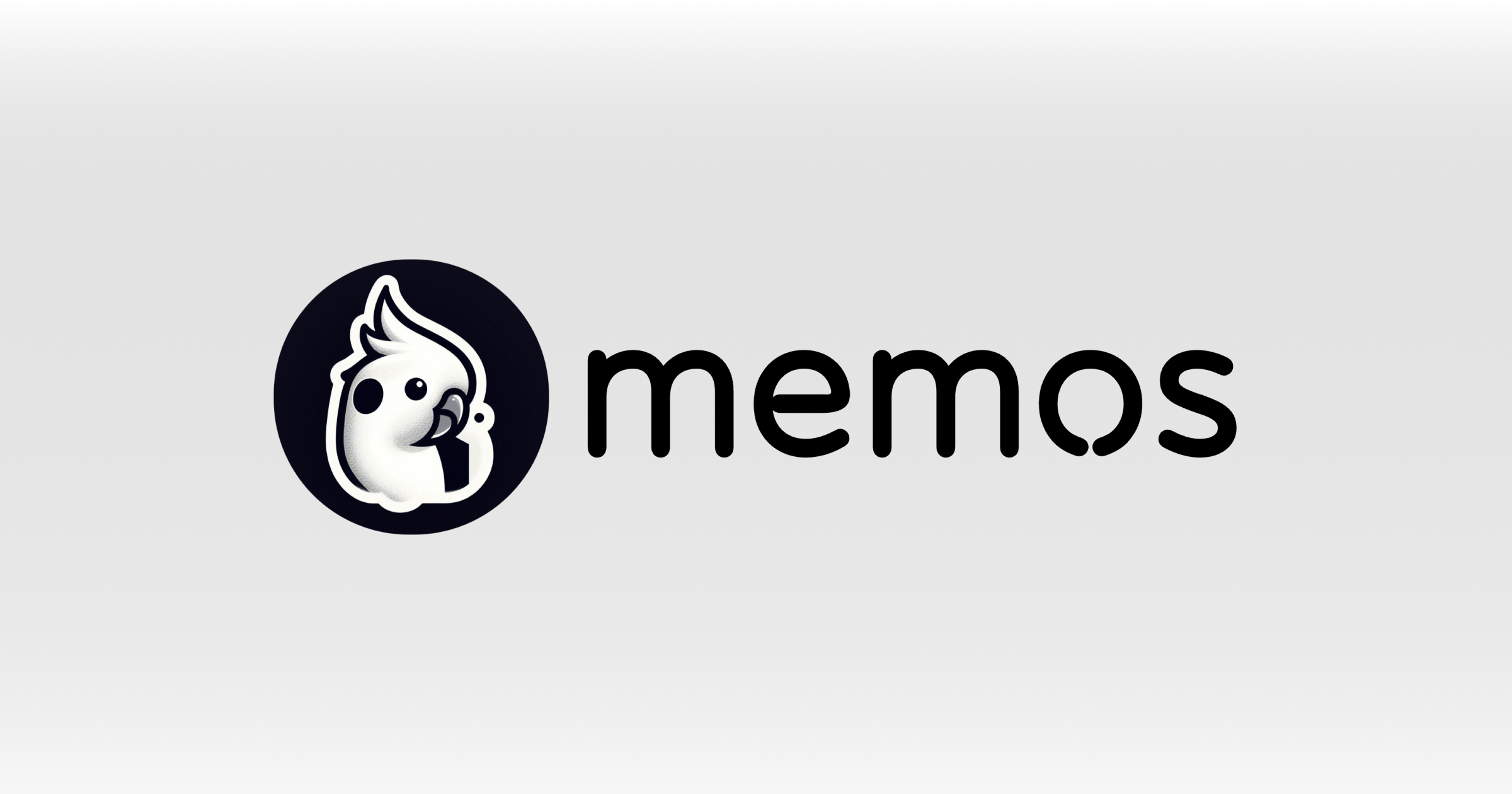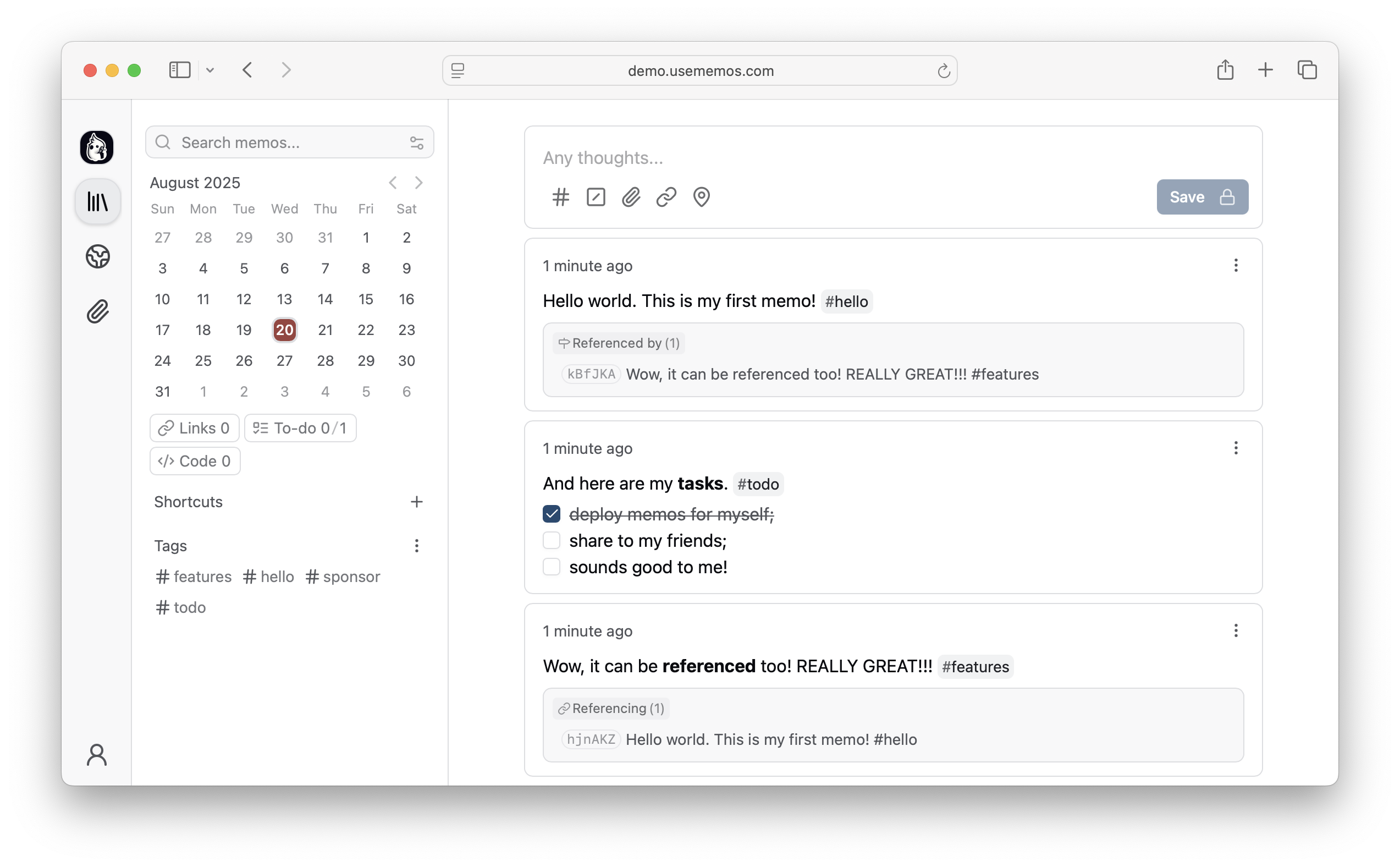
Deploy Memos (Open-Source Knowledge Base & Memo Notes Tool)
Memos [Feb ’26] (Open-Source Knowledge Base & Memo Notes Tool), Self Host
memos-github
Just deployed
/var/opt/memos
Just deployed
/var/lib/postgresql/data

Deploy and Host Managed Memos App with a single click on Railway
Memos App is a free, open-source knowledge base and memo notes tool available on GitHub. It offers a lightweight yet powerful way to capture thoughts, store online memos, and collaborate. With Memos, you gain full control over your notes and data, whether you self host the memos app or use managed memos hosting. This makes it one of the most flexible free note taking tools for individuals, teams, and enterprises. You can host it directly by clicking the 'Deploy Now' button.
About Hosting Memos App on Railway (Self Hosting UseMemos App on Railway)
You can self host the Memos App to keep all your online memo notes and configurations under your control, with zero third-party dependencies. The self hosted memos app is built to be simple, privacy-friendly, and easy to deploy. With Railway, you can launch Memos in just one click without worrying about server setup, scaling, or ongoing maintenance. This makes Railway the perfect choice for deploying oss memos hosting or experimenting with new workflows.
Why Deploy Managed Memos App on Railway
Deploying a managed Memos App service on Railway provides effortless setup, automated scaling, and seamless hosting, letting you focus entirely on taking notes and creating knowledge base instead of managing servers. It combines the privacy and flexibility of open source memos with the simplicity of a fully managed cloud platform.
Railway vs DigitalOcean:
DigitalOcean requires manual server setup, installing dependencies, and managing storage for memo notes. With Railway, you can deploy Memos Docker containers instantly and enjoy automated scaling and zero sysadmin overhead.
Railway vs Linode:
Linode expects you to patch servers, manage backups, and optimize configurations. Railway simplifies the process by running memos inside secure managed containers, so you only need one click to start using your online memo service.
Railway vs Vultr:
Vultr users handle OS-level admin, custom networking, and disk management. Railway removes all these complexities by managing the memos hosting infrastructure for you.
Railway vs AWS Lightsail:
AWS Lightsail provides VPS hosting, but you need to manually configure scaling, firewalls, and environments. Railway abstracts this away so you can deploy memo notes in seconds.
Railway vs Hetzner:
Hetzner is cost-effective but hands-on. Railway is designed for simplicity: automatic updates, built-in logs, scaling, and no need to touch server configs.
Common Use Cases for Memos App
Here are 5 common scenarios where the Memos App shines:
- Personal Knowledge Base: Store ideas, reminders, links, and notes for long-term reference.
- Team Collaboration: Share memos across a team as a lightweight, open source knowledge base.
- Project Tracking: Create memo notes for milestones, bugs, and project decisions.
- Daily Journaling: Maintain a digital journal or diary with privacy and no external ads.
- Learning Notes: Students and professionals can use memos to store study material, research highlights, and work logs.
Dependencies for Memos App Hosted on Railway
To host Memos on Railway, you need:
- A supported database (SQLite by default, MySQL or PostgreSQL for production). This template uses PostgreSQL Database.
- Docker image (for Memos Docker deploy), you can find the official docker image on Github.
- Environment variables for database credentials and runtime configuration.
Deployment Dependencies for Managed Memos App
On Railway, these dependencies are provisioned automatically. Just link your GitHub repository (or use the Railway deploy template, much easier!), and Memos will run in secure, scalable containers.
Implementation Details for Memos App
For deployment, you’ll set environment variables such as:
DB_TYPE(sqlite, mysql, or postgres)DB_URL(connection string)PORT(default: 8080)
Railway takes care of provisioning and running the database if you choose managed DB hosting.

How does Memos look against other notetaking platforms (Alternatives to Memos)
Memos vs Notion
Memos is lightweight and open source, while Notion is feature-rich but closed-source and subscription-based. For users seeking a free self hosted memos app, Memos is ideal.
Memos vs Obsidian
Obsidian is markdown-first with plugins and advanced graphing, while Memos is simpler and web-native. Both are excellent, but Memos excels in quick memo notes and online collaboration.
Memos vs Evernote
Evernote is a commercial service with limited free usage. Memos is free, open source, and self hostable. Perfect for users avoiding vendor lock-in.
Memos vs Logseq
Logseq focuses on outliner workflows, while Memos provides a direct, simple online memo-taking experience with fewer learning curves.
Memos vs Google Keep
Google Keep is free but limited and not open source. Memos offers self hosted memos hosting, giving you privacy and unlimited customization.
How to use Memos?
Using Memos is as easy as opening the dashboard in your browser:
- Deploy Memos on Railway.
- Open the dashboard.
- Create your first memo note.
- Organize with tags, links, and filters.
- Enjoy Writing and Organisation!
Everything you write is saved in your database, either local SQLite or a managed PostgreSQL database on Railway.
How to Self Host Memos on Other VPS
Clone the Repository
Download from GitHub: https://github.com/usememos/memos
Install Dependencies
Ensure Docker and a supported database are installed on your VPS.
Configure Environment Variables
Set DB credentials like DB_TYPE, DB_URL, and PORT.
Start the Memos Application
Run docker-compose up -d or build the project manually.
Access the Memos Dashboard
Visit your server’s public IP, log in, and start creating memos.
With Railway, this entire flow is reduced to one click. Click 'Deploy Now' today!
Features of Memos App
- Lightweight, privacy-first note-taking.
- Online memo support accessible anywhere.
- Tagging, linking, and filtering features.
- Built-in API for integrations.
- Markdown support for formatting.
- Open source knowledge base capabilities.
- Easy deployment via Docker or Railway templates.
Official Pricing of Memos App
Memos is free and open source. You only pay for hosting if you use a cloud provider. Railway typically costs $5–$10 per month for the base app instance. Adding a managed database may increase costs slightly, but it remains cheaper than commercial alternatives.
Self Hosting Memos vs Paid Tools
Self hosting Memos is 100% free, giving you complete control and privacy. Paid tools like Notion, Evernote, or Obsidian sync often come with recurring fees and closed data ecosystems. Memos Docker and Railway simplify self hosting, making it a cost-effective choice.
Monthly Cost of Self Hosting Memos on Railway
On average, expect $5 USD per month on the hobbies plan. This covers hosting, storage, and managed DBs. It’s still cheaper than most SaaS subscriptions. The price may go a little up based on your usage, but won't go up more than additional $2-3.
Minimum System Requirements for Hosting Memos
- 512MB RAM minimum (1GB recommended).
- 1 CPU core.
- 1GB storage for small deployments (scale as needed).
FAQs
What is the Memos App?
Memos is an open source knowledge base and note-taking app that lets you create, store, and organize online memo notes with privacy and flexibility.
How do I self host Memos?
You can self host Memos by deploying it on a VPS with Docker, or use Railway’s one-click deploy template for instant setup.
What are the key features of Memos?
Memos supports markdown, tags, filters, links, and APIs. It works as both a personal memo tool and a lightweight open source knowledge base.
How do I deploy Memos on Railway?
Simply click the “Deploy Now” button, set environment variables, and Railway handles scaling, monitoring, and hosting automatically.
What are the dependencies for Memos hosting?
Memos requires a database (SQLite, PostgreSQL, or MySQL) and can run as a Docker container. This template uses PostgreSQL.
What are common use cases for Memos?
Personal notes, project tracking, journaling, team collaboration, and lightweight documentation. This app is perfect if you want privacy.
How does Memos compare to paid note-taking apps?
Memos is free, open source, and privacy-focused, while most paid apps are closed-source and subscription-based.
How much does it cost to self host Memos on Railway?
Usually $5 per month, depending on storage and database usage. It might be a little more on other VPS since Railway only charges on usage.
Where can I find the official Memos source code?
You can access it at the official GitHub repository: https://github.com/usememos/memos
Deploy Memos App on Railway today and enjoy a fully managed, scalable, privacy-friendly memo system in just one click!
Template Content
memos-github
Shinyduo/memos-github